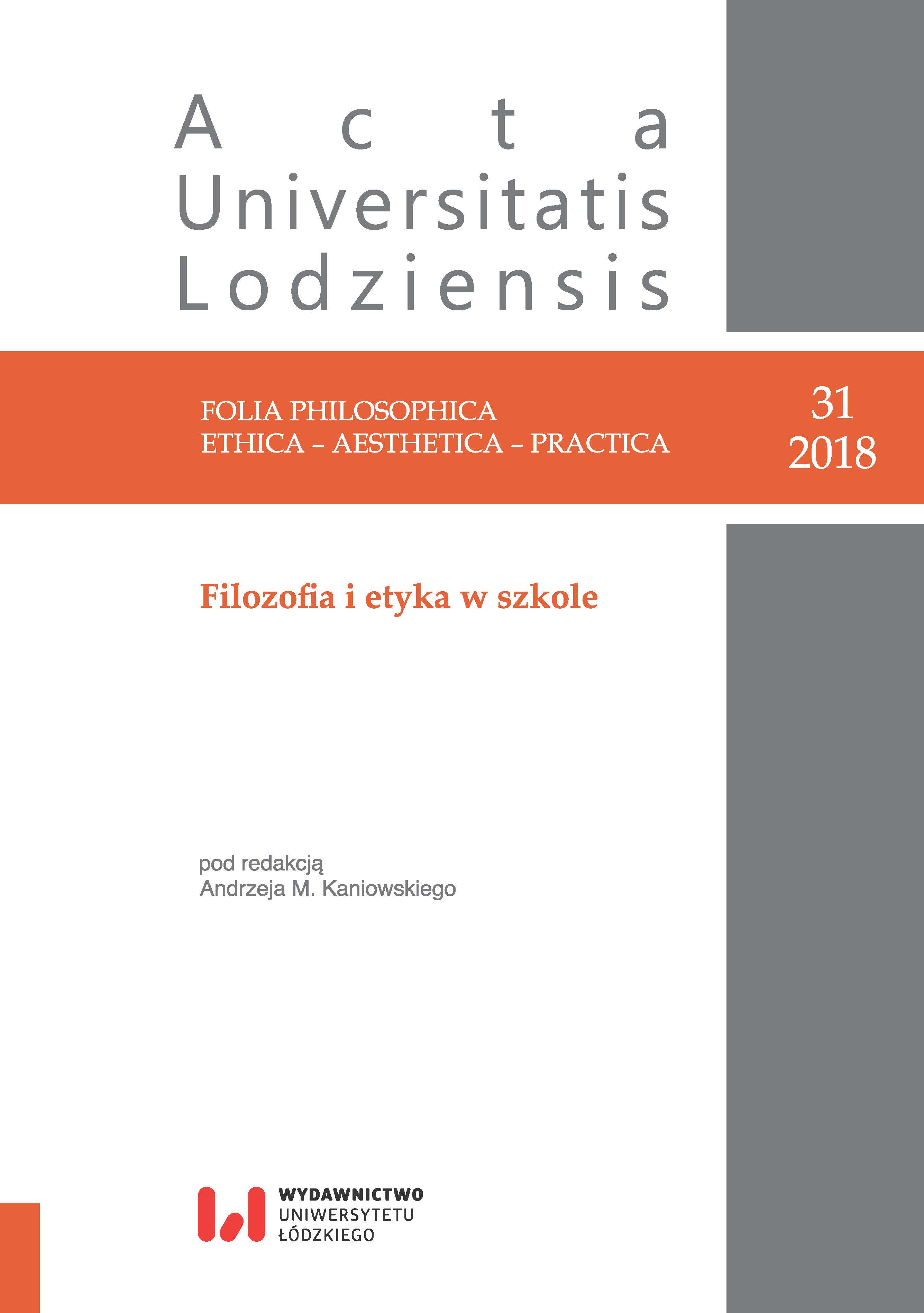Ethical gradualism – beyond anthropocentrism and biocentrism?
DOI:
https://doi.org/10.18778/0208-6107.31.02Keywords:
ethical gradualism, anthropocentrism, moral rights, animal rights, ethics of discourse, metaethicsAbstract
The realm of ethics is most often restricted to man and the human world: only humans can act morally or immorally, only humans can be morally praised or blamed, only humans can be moral agents and only humans can be moral subjects. To which extent is this ethical anthropocentrism tenable? In the light of contemporary biological knowledge and its recognition of biological continuities and gradual distribution of properties characteristic for living creatures, how can such strict division and the notion of the privileged position of man be still valid? Should not we reduce or overcome human speciesism? In this paper I shall consider arguments in favour of such a paradigmatically unique ethical standing for humans, and I shall look into arguments in favour of an ethical gradualism between humans and other mammals and between man and nature.
References
Anagnostopoulos Georgios, Aristotle on the Goals and Exactness of Ethics, University of California Press, San Diego 1994.
Google Scholar
Animal Rights and Human Obligations, red. Tom Regan, Peter Singer, Prentice-Hall, Englewood Clifs, New Jersey 1976.
Google Scholar
Animals, Men and Morals: An Inquiry into the Maltreatment of Non-humans, red. Roslind Godlovitch, Stanley Godlovitch, J. Harris, Taplinger, New York 1972.
Google Scholar
Apel Karl-Otto, Diskurs und Verantwortung: Das Problem des Übergangs zur postkonventionellen Moral, Suhrkamp Verlag, Frankfurt a. M. 1988.
Google Scholar
Benhabib Seyla, In the Shadow of Aristotle and Hegel: Communicative Ethics and Current Controversies in Practical Philosophy, w: Hermeneutics and Critical Theory of Ethics and Politics, red. Michael Kelly, MIT Press, Cambridge, Mass. 1990.
Google Scholar
Bentham Jeremy, Wprowadzenie do zasad moralności i prawodawstwa, przeł. Bogdan Nawroczyński, PWN, Warszawa 1958.
Google Scholar
Böhler Dietrich, Menschenwürde und Menschentötung. Über Diskursethik und utilitaristische Ethik, „Zeitschrift für Evangelische Ethik” 1991, t. 35, nr 1, s. 166–186.
Google Scholar
Böhler Dietrich, Mensch und Natur: Verstehen, Konstruieren, Verantworten, „Deutsche Zeitschrift für Philosophie” 1991, t. 39, nr 9, s. 999–1019.
Google Scholar
Brennan John M., The Open-Texture of Moral Concepts, Macmillan, London 1977.
Google Scholar
Clark Stephen, The Moral Status of Animals, Oxford University Press, Oxford 1977.
Google Scholar
Cohen Carl, The Case of the Use of Animals in Biomedical Research, „The New England Journal of Medicine” 1986, t. 315, nr 14, s. 865–870.
Google Scholar
D’Amato Anthony, Sudhir K. Chopra, Whales: Their Emerging Right to Life, „American Journal of International Law” 1991, t. 85, nr 1, s. 21–62.
Google Scholar
Dworkin Ronald, Biorąc prawa poważnie, przeł. Tomasz Kowalski, Wydawnictwo Naukowe PWN, Warszawa 1998.
Google Scholar
Earthbound. New Introductory Essays in Environmental Ethics, red. Tom Regan, Random House, New York 1984.
Google Scholar
Frey Raymond, Interests and Rights: The Case against Animals, Oxford University Press, Oxford 1980.
Google Scholar
Frey Raymond, Rights, Killing and Suffering, Clarendon Press, Oxford 1983.
Google Scholar
Habermas: Critical Debates, red. John B. Thompson i David Held, Macmillan, London 1982.
Google Scholar
Habermas Jürgen, Erläuterungen zur Diskursethik, Suhrkamp Verlag, Frankfurt a. M. 1991.
Google Scholar
Killing and Letting Die, red. Bonnie Steinbock, Alastair Norcross, Prentice-Hall, Englewood Clifs, New Jersey 1980.
Google Scholar
Kuhse Helga, Peter Singer, Should the Baby Live? The Problem of Handicapped Infants, Oxford University Press, Oxford 1985.
Google Scholar
Leahy Michael P.T., Against Liberation: Putting Animals in Perspective, Routledge, London 1991.
Google Scholar
Matters of Life and Death. New Introductory Essays in Moral Philosophy, red. Tom Regan, Random House, New York 1986.
Google Scholar
Midgley Mary, Animals and Why They Matter, University of Georgia Press, Athens 1983.
Google Scholar
The Moral Import of Science, red. Andrew J. I. Jones, Sygma Forlag, Bergen 1988.
Google Scholar
Passmore John, Man’s Responsibility for Nature: Ecological Problems and Western Traditions, University of California Press, Duckworth 1974.
Google Scholar
The Problem of Abortion, red. J. Feinberg, Wadswoth Publishing Co., Belmont, California 1973.
Google Scholar
Rachels James, Created from Animals. The Moral Implications of Darwinism, Oxford University Press, Oxford 1990.
Google Scholar
Regan Tom, The Case for Animal Rights, University of California Press, Berkeley 1984.
Google Scholar
Ruse Michael, Taking Darwin Seriously, Blackwell, Oxford 1986.
Google Scholar
Singer Peter, Applied Ethics, Oxford University Press, Oxford 1986.
Google Scholar
Singer Peter, On Being Silenced in Germany, „The New York Review”, 15 sierpnia 1991.
Google Scholar
Skirbekk Gunnar, Rationality and Modernity, Scandinavian University Press, Oslo 1993.
Google Scholar
Skjervheim Hans, Objectivism and the Study of Man, Scandinavian University Press, Oslo 1959.
Google Scholar
Taylor Paul W., Respect for Nature. A Theory of Environmental Ethics, Princeton University Press, Princeton, New Jersey 1986.
Google Scholar
Tranøy Knut Erik, On the Ethics of Animal and Human Experimentation, w: The Moral Import of Science: Essays on Normative Theory, Scientific Activity and Wittgenstein, red. Andrew J. I. Jones, Sygma Forlag, Bergen 1988, s. 83–97.
Google Scholar
Tooley Michael, Abortion and Infanticide, Claredon Press, Oxford 1984.
Google Scholar
Waismann Friedrich, Verifiability Logic and Language, red. Antony Flew, seria I, Blackwell, Oxford 1960.
Google Scholar
Winch Peter, Idea nauki o społeczeństwie i jej związki z filozofią, przeł. B. Chwedeńczuk, Oficyna Naukowe, Warszawa 1995.
Google Scholar
Zur Debate über Euthanasie, red. Rainer Hegselmann i Reinhold Merkel, Suhrkamp Verlag, Frankfurt a. M. 1991.
Google Scholar
Downloads
Published
How to Cite
Issue
Section
License

This work is licensed under a Creative Commons Attribution-NonCommercial-NoDerivatives 4.0 International License.












